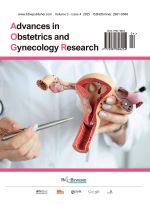Abstract
Objective: To analyze the relationship between postpartum depression symptoms, perceived social support, sleep quality, and postpartum stress in elderly parturient women. Methods: 76 elderly parturient women who were admitted to the hospital for delivery between January 2023 and January 2025 were selected. Based on the Edinburgh Postnatal Depression Scale (EPDS) score, 21 cases with a score of ≥ 10 were identified as having postpartum depression symptoms, while 55 cases with a score of < 10 were identified as not having postpartum depression symptoms. The Perceived Social Support Scale (PSSS) score, Pittsburgh Sleep Quality Index (PSQI) score, and Maternal Postpartum Stress Scale (MPSS) score were compared between the two groups. The correlation between each score and postpartum depression symptoms was evaluated, and logistic regression analysis was performed to assess the influencing factors of postpartum depression symptoms. Results: The PSSS score of those with postpartum depression symptoms was lower than those without, while the PSQI score and MPSS score were higher (P < 0.05). Pearson linear correlation showed a negative correlation between postpartum depression symptoms and PSSS total score and dimension scores, a negative correlation with PSQI score, and a positive correlation with MPSS total score and dimension scores (P < 0.05). Logistic regression analysis showed that PSSS score, PSQI score, and MPSS score were all influencing factors of postpartum depression symptoms (P < 0.05). Conclusion: Postpartum depression symptoms in elderly parturient women are closely related to perceived social support, sleep quality, and postpartum stress. Targeted intervention for elderly parturient women is necessary to effectively prevent postpartum depression.
References
Wang Y, Zhang F, Xu X, 2025, Relationship between Postpartum Depressive Symptoms and Perceived Social Support, Sleep Quality, and Postpartum Stress among Advanced-Age Parturient Women. Chinese Journal of Mental Health, 39(3): 215–220.
Xin Y, Ma J, Zhou L, et al., 2025, A Longitudinal Study on Social Support and Postpartum Depression among Postpartum Women from 0 to 6 Months of Breastfeeding. Chinese Journal of Practical Nursing, 41(1): 35–40.
Yuan L, Yang K, Gao B, 2025, Effects of IPT-G Therapy on Depression Level, Social Support, and Interpersonal Function in Patients with Postpartum Depression. International Journal of Psychiatry, 52(1): 173–176.
Wang X, An S, Chen H, 2024, The Influence of Family Care and Personality Traits on Postpartum Depression and the Mediating Role of Social Support. Chinese Journal of Maternal and Child Health, 15(2): 46–51.
Cao Y, Li L, Li Y, et al., 2023, A Study on the Correlation between Postpartum Depression and Family Care and Social Support. Guide to Women’s and Children’s Health, 2(19): 11–14.
Gao S, Liu F, Li X, et al., 2023, The Mediating Effect of Primiparas’ Ruminative Thinking on the Gap between Expected and Actual Social Support and Postpartum Depression. Chinese Journal of Practical Nursing, 39(18): 1410–1415.
Yang H, Nie Y, Ning R, 2020, Relationship between Depressive Attributional Style, Sense of Loss of Control, Social Support, and Postpartum Depression among Older Multiparas. Chinese Journal of Family Planning, 28(12): 2025–2029.
Wang C, Liu R, 2022, Relationship between Postpartum Depression and Adult Attachment and Perceived Social Support. Journal of Clinical Psychosomatic Diseases, 28(2): 71–74.
